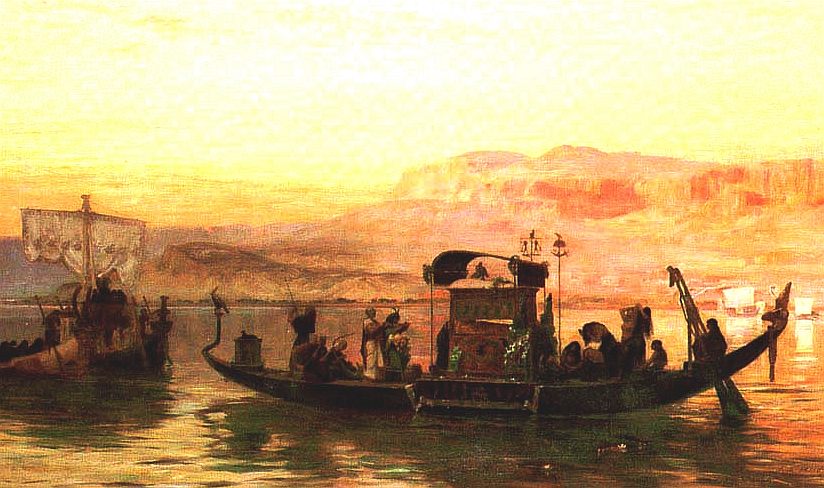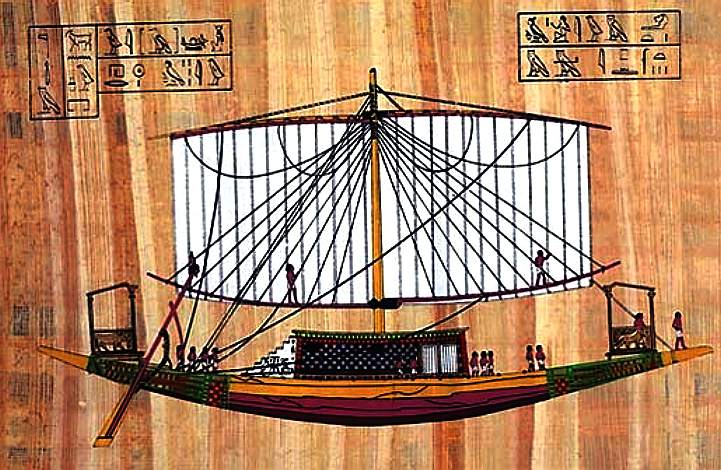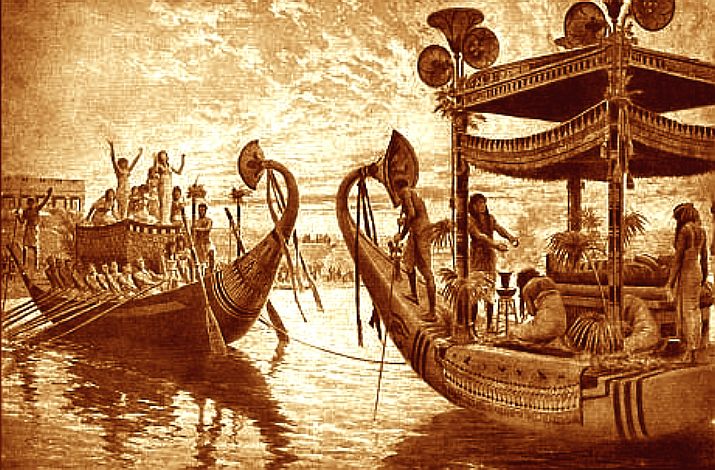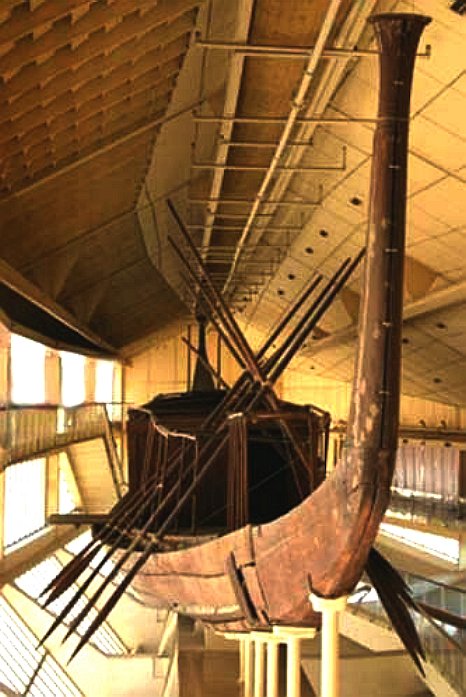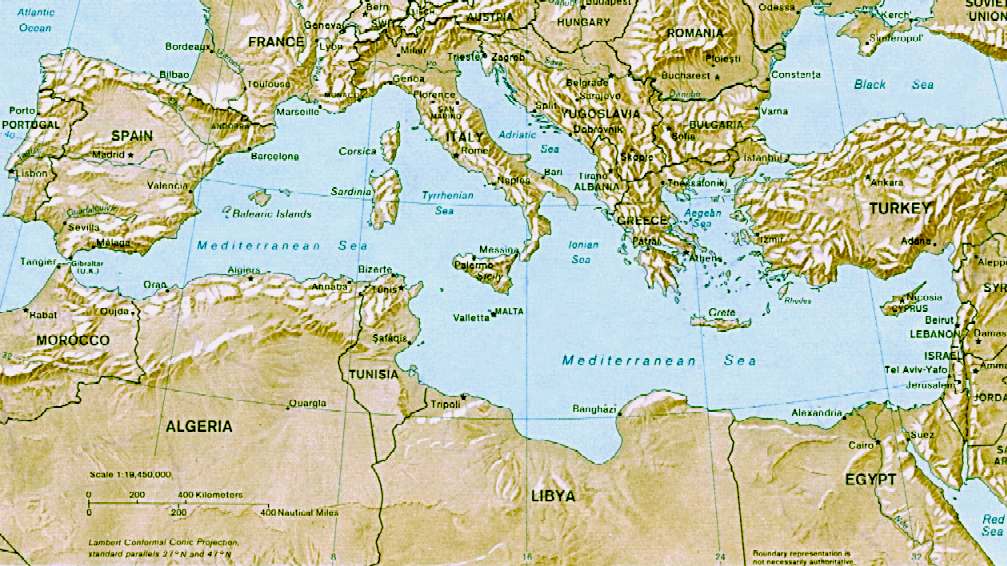
The
Mediterranean Sea is awash with sunken treasures. When Alexander
the Great died in Babylon in 323 BC, his companion, Ptolemy I, laid claim to Egypt as his domain. He founded a dynasty that was to rule for three hundred years from Alexandria. Ptolemy II made Alexandria
the center of culture and founded the Alexandria Library and
Museo, the first research center and “think tank.” The Pharos Lighthouse was built, and it was one of the Seven Wonders of the Ancient World. Its beam of light could be seen for thirty miles.
Alexander III of Macedon (20/21 July 356 BC – 10/11 June 323 BC), commonly known as Alexander the Great, was a king of the ancient Greek kingdom of Macedon. He succeeded his father Philip II to the throne in 336 BC at the age of 20, and spent most of his ruling years conducting a lengthy military campaign throughout Western Asia and
Egypt. By the age of 30, he had created one of the largest empires in history, stretching from Greece to northwestern India. He was undefeated in battle and is widely considered to be one of history's greatest and most successful military commanders.
Until the age of 16, Alexander was tutored by Aristotle. In 335 BC, shortly after his assumption of kingship over Macedon, he campaigned in the Balkans and reasserted control over Thrace and parts of Illyria before marching on the city of Thebes, which was subsequently destroyed in battle. Alexander then led the League of Corinth, and used his authority to launch the pan-Hellenic project envisaged by his father, assuming leadership over all Greeks in their conquest of Persia.
In 334 BC, he invaded the Achaemenid Persian Empire and began a series of campaigns that lasted for 10 years. Following his conquest of Asia Minor, Alexander broke the power of Achaemenid Persia in a series of decisive battles, including those at Issus and Gaugamela; he subsequently overthrew Darius III and conquered the Achaemenid Empire in its entirety. After the fall of Persia, the Macedonian Empire held a vast swath of territory between the
Adriatic Sea and the Indus
River. Alexander endeavored to reach the "ends of the world and the Great Outer Sea" and invaded India in 326 BC, achieving an important victory over Porus, an ancient Indian king of present-day Punjab, at the Battle of the Hydaspes. Due to the demand of his homesick troops, he eventually turned back at the Beas River and later died in 323 BC in Babylon, the city of Mesopotamia that he had planned to establish as his empire's capital. Alexander's death left unexecuted an additional series of planned military and mercantile campaigns that would have begun with a Greek invasion of Arabia. In the years following his death, a series of civil wars broke out across the Macedonian Empire, eventually leading to its disintegration at the hands of the
Diadochi. And the creation of the Seleucid
Empire, by his former admiral Seleucus
I Nicator.
With his death marking the start of the Hellenistic period, Alexander's legacy includes the cultural diffusion and syncretism that his conquests engendered, such as Greco-Buddhism and Hellenistic Judaism. He founded more than twenty cities, with the most prominent being the city of Alexandria in Egypt. Alexander's settlement of Greek colonists and the resulting spread of Greek culture led to the overwhelming dominance of Hellenistic civilization and influence as far east as the Indian subcontinent. The Hellenistic period developed through the Roman Empire into modern Western culture; the Greek language became the lingua franca of the region and was the predominant language of the Byzantine Empire up until its collapse in the mid-15th century AD. Greek-speaking communities in central Anatolia and in far-eastern Anatolia survived until the Greek genocide and Greek–Turkish population exchanges of the early 20th century AD. Alexander became legendary as a classical hero in the mould of Achilles, featuring prominently in the historical and mythical traditions of both Greek and non-Greek cultures. His military achievements and unprecedented enduring successes in battle made him the measure against which many later military leaders would compare themselves, and his tactics remain a significant subject of study in military academies worldwide.
CONQUEST OF THE MEDITERRANEAN COAST AND EGYPT
From Issus Alexander marched south into Syria and Phoenicia, his object being to isolate the Persian fleet from its bases and so to destroy it as an effective fighting force. The Phoenician cities Marathus and Aradus came over quietly, and Parmenio was sent ahead to secure Damascus and its rich booty, including Darius’s war chest. In reply to a letter from Darius offering peace, Alexander replied arrogantly, recapitulating the historic wrongs of Greece and demanding unconditional surrender to himself as lord of Asia. After taking Byblos (modern Jubayl) and Sidon (Arabic Ṣaydā), he met with a check at Tyre, where he was refused entry into the island city. He thereupon prepared to use all methods of siegecraft to take it, but the Tyrians resisted, holding out for seven months. In the meantime (winter 333–332) the Persians had counterattacked by land in Asia
Minor - where they were defeated by Antigonus, the satrap of Greater
Phrygia - and by sea, recapturing a number of cities and islands.
While the siege of Tyre was in progress, Darius sent a new offer: he would pay a huge ransom of 10,000 talents for his family and cede all his lands west of the Euphrates. “I would accept,” Parmenio is reported to have said, “were I Alexander”; “I too,” was the famous retort, “were I Parmenio.” The storming of Tyre in July 332 was Alexander’s greatest military achievement; it was attended with great carnage and the sale of the women and children into slavery. Leaving Parmenio in Syria, Alexander advanced south without opposition until he reached Gaza on its high mound; there bitter resistance halted him for two months, and he sustained a serious shoulder wound during a sortie. There is no basis for the tradition that he turned aside to visit Jerusalem.
In November 332 he reached Egypt. The people welcomed him as their deliverer, and the Persian satrap Mazaces wisely surrendered. At Memphis Alexander sacrificed to Apis, the Greek term for Hapi, the sacred Egyptian bull, and was crowned with the traditional double crown of the pharaohs; the native priests were placated and their religion encouraged. He spent the winter organizing Egypt, where he employed Egyptian governors, keeping the army under a separate Macedonian command. He founded the city of Alexandria near the western arm of the Nile on a fine site between the sea and Lake Mareotis, protected by the island of Pharos, and had it laid out by the Rhodian architect Deinocrates. He is also said to have sent an expedition to discover the causes of the flooding of the Nile. From Alexandria he marched along the coast to Paraetonium and from there inland to visit the celebrated oracle of the god Amon (at Sīwah); the difficult journey was later embroidered with flattering legends. On his reaching the oracle in its oasis, the priest gave him the traditional salutation of a pharaoh, as son of Amon; Alexander consulted the god on the success of his expedition but revealed the reply to no one. Later the incident was to contribute to the story that he was the son of Zeus and, thus, to his “deification.” In spring 331 he returned to Tyre, appointed a Macedonian satrap for Syria, and prepared to advance into Mesopotamia. His conquest of Egypt had completed his control of the whole eastern Mediterranean coast.
In July 331 Alexander was at Thapsacus on the Euphrates. Instead of taking the direct route down the river to Babylon, he made across northern Mesopotamia toward the Tigris, and Darius, learning of this move from an advance force sent under Mazaeus to the Euphrates crossing, marched up the Tigris to oppose him. The decisive battle of the war was fought on October 31, on the plain of Gaugamela between Nineveh and Arbela. Alexander pursued the defeated Persian forces for 35 miles to Arbela, but Darius escaped with his Bactrian cavalry and Greek mercenaries into Media.
Alexander now occupied Babylon, city and province; Mazaeus, who surrendered it, was confirmed as satrap in conjunction with a Macedonian troop commander, and quite exceptionally was granted the right to coin. As in
Egypt, the local priesthood was encouraged. Susa, the capital, also surrendered, releasing huge treasures amounting to 50,000 gold talents; here Alexander established Darius’s family in comfort. Crushing the mountain tribe of the Ouxians, he now pressed on over the Zagros range into Persia proper and, successfully turning the Pass of the Persian Gates, held by the satrap Ariobarzanes, he entered Persepolis and Pasargadae. At Persepolis he ceremonially burned down the palace of Xerxes, as a symbol that the Panhellenic war of revenge was at an end; for such seems the probable significance of an act that tradition later explained as a drunken frolic inspired by Thaïs, an Athenian courtesan. In spring 330 Alexander marched north into Media and occupied its capital. The Thessalians and Greek allies were sent home; henceforward he was waging a purely personal war.
As Mazaeus’s appointment indicated, Alexander’s views on the empire were changing. He had come to envisage a joint ruling people consisting of Macedonians and Persians, and this served to augment the misunderstanding that now arose between him and his people. Before continuing his pursuit of Darius, who had retreated into Bactria, he assembled all the Persian treasure and entrusted it to Harpalus, who was to hold it at Ecbatana as chief treasurer. Parmenio was also left behind in Media to control communications; the presence of this older man had perhaps become irksome.
In midsummer 330 Alexander set out for the eastern provinces at a high speed via Rhagae (modern Rayy, near Tehrān) and the Caspian Gates, where he learned that Bessus, the satrap of Bactria, had deposed Darius. After a skirmish near modern Shāhrūd, the usurper had Darius stabbed and left him to die. Alexander sent his body for burial with due honours in the royal tombs at Persepolis.
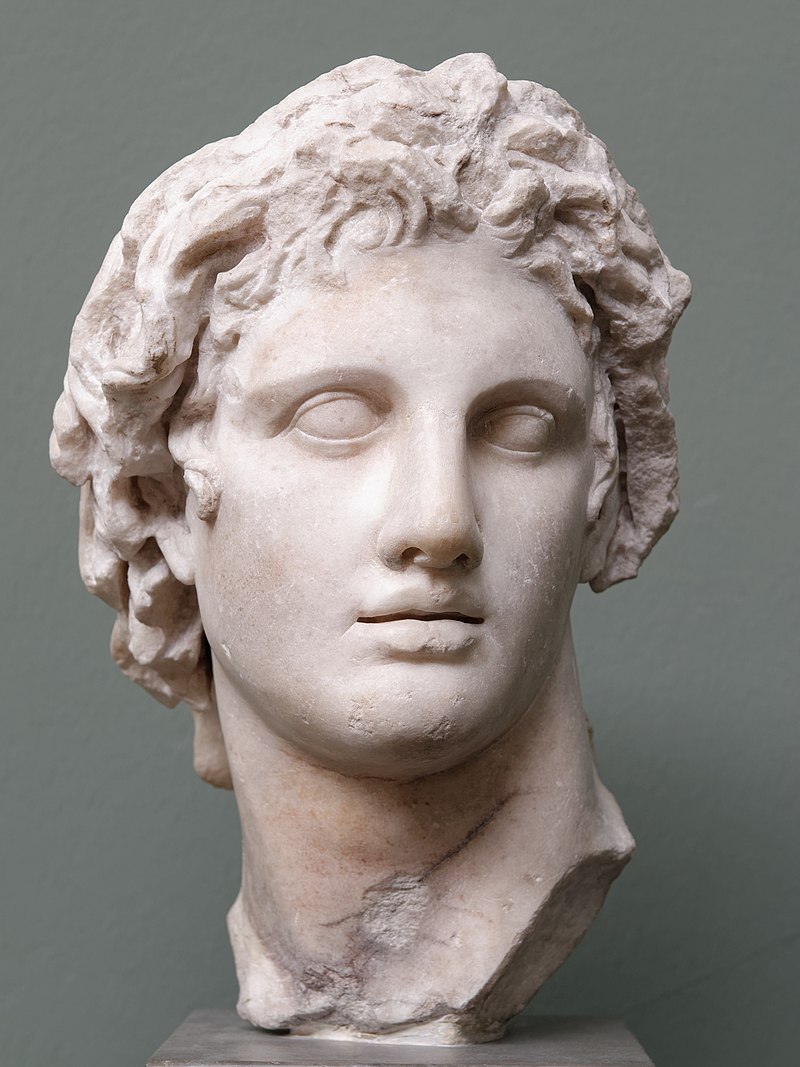
Alexander
the Great, never lost a military battle, but was known to
consume large quantities of alcohol, as wines various. The
illness that killed the tactical genius took some 11 - 14
days to kill him, suggesting he was not deliberately
poisoned, but fell foul of typhoid with complications. We
will of course, never know what actually happened. Just
mourn the loss of a legendary leader, and wonder at modern
medicine, that tends to prolong life, and increase our
understanding of health related matters, eating well and
exercising.
MILITARY TACTICS
Alexander perhaps earned the epithet "the Great" due to his unparalleled success as a military commander; he never lost a battle, despite typically being outnumbered. This was due to use of terrain, phalanx and cavalry tactics, bold strategy, and the fierce loyalty of his troops. The Macedonian phalanx, armed with the sarissa, a spear 6 metres (20 ft) long, had been developed and perfected by Philip II through rigorous training, and Alexander used its speed and manoeuvrability to great effect against larger but more disparate Persian forces. Alexander also recognized the potential for disunity among his diverse army, which employed various languages and weapons. He overcame this by being personally involved in battle, in the manner of a Macedonian king.
In his first battle in Asia, at Granicus, Alexander used only a small part of his forces, perhaps 13,000 infantry with 5,000 cavalry, against a much larger Persian force of 40,000. Alexander placed the phalanx at the center and cavalry and archers on the wings, so that his line matched the length of the Persian cavalry line, about 3 km (1.86 mi). By contrast, the Persian infantry was stationed behind its cavalry. This ensured that Alexander would not be outflanked, while his phalanx, armed with long pikes, had a considerable advantage over the Persians' scimitars and javelins. Macedonian losses were negligible compared to those of the Persians.
At Issus in 333 BC, his first confrontation with Darius, he used the same deployment, and again the central phalanx pushed through. Alexander personally led the charge in the center, routing the opposing army. At the decisive encounter with Darius at Gaugamela, Darius equipped his chariots with scythes on the wheels to break up the phalanx and equipped his cavalry with pikes. Alexander arranged a double phalanx, with the center advancing at an angle, parting when the chariots bore down and then reforming. The advance was successful and broke Darius's center, causing the latter to flee once again.
When faced with opponents who used unfamiliar fighting techniques, such as in Central Asia and India, Alexander adapted his forces to his opponents' style. Thus, in Bactria and Sogdiana, Alexander successfully used his javelin throwers and archers to prevent outflanking movements, while massing his cavalry at the center. In India, confronted by Porus's elephant corps, the Macedonians opened their ranks to envelop the elephants and used their sarissas to strike upwards and dislodge the elephants' handlers.
DEATH
Before his death, someone asked Alexander on who would be his designated successor should he die, he responded: "To the strongest one." He may have also added that there would be funeral games to be played after his death.
On either 10 or 11 June 323 BC, Alexander died in the palace of Nebuchadnezzar II, in Babylon, at age 32. There are two different versions of Alexander's death, differing slightly in details. Plutarch's account is that roughly 14 days before his death, Alexander entertained admiral Nearchus and spent the night and next day drinking with Medius of Larissa. Alexander developed a fever, which worsened until he was unable to speak. The common soldiers, anxious about his health, were granted the right to file past him as he silently waved at them. In the second account, Diodorus recounts that Alexander was struck with pain after downing a large bowl of unmixed wine in honour of Heracles followed by 11 days of weakness; he did not develop a fever, instead dying after some agony. Arrian also mentioned this as an alternative, but Plutarch specifically denied this claim.
Given the propensity of the Macedonian aristocracy to assassination, foul play featured in multiple accounts of his death. Diodorus, Plutarch, Arrian and Justin all mentioned the theory that Alexander was poisoned. Justin stated that Alexander was the victim of a poisoning conspiracy, Plutarch dismissed it as a fabrication, while both Diodorus and Arrian noted that they mentioned it only for the sake of completeness. The accounts were nevertheless fairly consistent in designating Antipater, recently removed as Macedonian viceroy, replaced by Craterus, as the head of the alleged plot. Perhaps taking his summons to Babylon as a death sentence and having seen the fate of Parmenion and Philotas, Antipater purportedly arranged for Alexander to be poisoned by his son Iollas, who was Alexander's wine-pourer. There was even a suggestion that Aristotle may have participated. The strongest argument against the poison theory is the fact that twelve days passed between the start of his illness and his death; such long-acting poisons were probably not available. However, in a 2003 BBC documentary investigating the death of Alexander, Leo Schep from the New Zealand National Poisons Centre proposed that the plant white hellebore (Veratrum album), which was known in antiquity, may have been used to poison Alexander.
In a 2014 manuscript in the journal Clinical Toxicology, Schep suggested Alexander's wine was spiked with Veratrum album, and that this would produce poisoning symptoms that match the course of events described in the Alexander Romance. Veratrum album poisoning can have a prolonged course and it was suggested that if Alexander was poisoned, Veratrum album offers the most plausible cause. Another poisoning explanation put forward in 2010 proposed that the circumstances of his death were compatible with poisoning by water of the river Styx (modern-day Mavroneri in Arcadia, Greece) that contained calicheamicin, a dangerous compound produced by bacteria.
Several natural causes (diseases) have been suggested, including malaria and typhoid fever. A 1998 article in the New England Journal of Medicine attributed his death to typhoid fever complicated by bowel perforation and ascending paralysis.
According to the University of Maryland School of Medicine report of 1998, Alexander probably died of typhoid fever (which, along with malaria, was common in ancient Babylon). In the week before his death, historical accounts mention chills, sweats, exhaustion and high fever, typical symptoms of infectious diseases, including typhoid fever. According to David W. Oldach from the University of Maryland Medical Center, Alexander also had "severe abdominal pain, causing him to cry out in agony". The associated account, however, comes from the unreliable Alexander Romance. According to Andrew N. Williams and Robert Arnott, in his last days Alexander was unable to speak, which was due to a previous injury to his neck during the Siege of Cyropolis.
Another recent analysis suggested pyogenic (infectious) spondylitis or meningitis. Other illnesses fit the symptoms, including acute pancreatitis, West Nile virus, and Guillain-Barré syndrome. Natural-cause theories also tend to emphasize that Alexander's health may have been in general decline after years of heavy drinking and severe wounds. The anguish that Alexander felt after Hephaestion's death may also have contributed to his declining health.
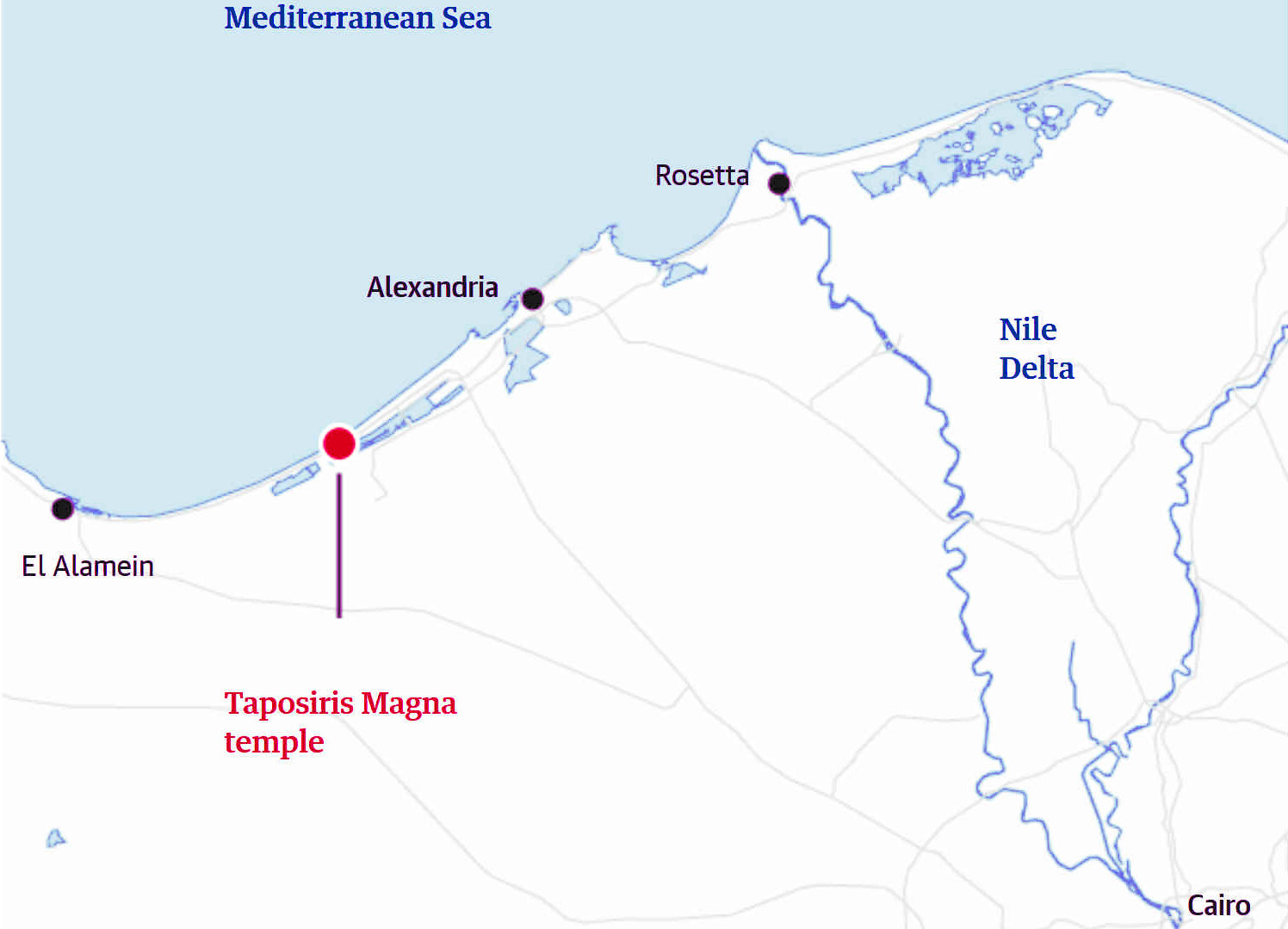
ALEXANDRIA
After Alexander the Great conquered Egypt in 332 BC, he established his city
called Alexandro, which became Alexandria.
On an April day in 331 B.C., on his way to an oracle in the Egyptian desert, before he set off to subdue Persia, Alexander envisioned a metropolis linking Greece and Egypt. Avoiding the treacherous mouth of the
Nile, with its shifting currents and unstable shoreline, he chose a site 20 miles west of the great river, on a narrow spit of land between the sea and a lake. He paced out the city limits of his vision: ten miles of walls and a grid pattern of streets, some as wide as 100 feet.
For nearly a millennium, Alexandria was the Mediterranean’s bustling center of trade.
Alexandria
was washed into the Mediterranean Sea in 365 AD, following
an earthquake and subsequent tsunami.



